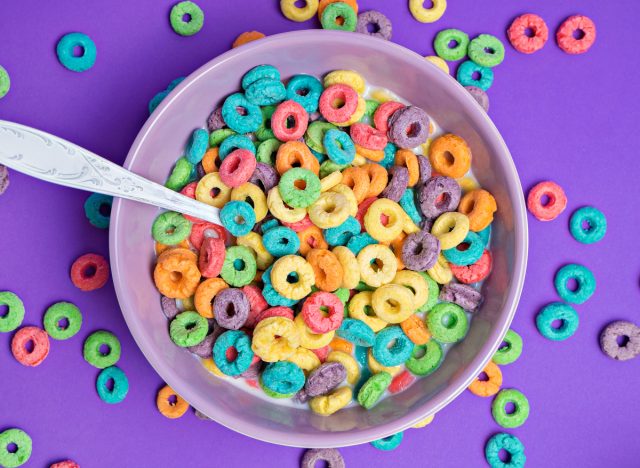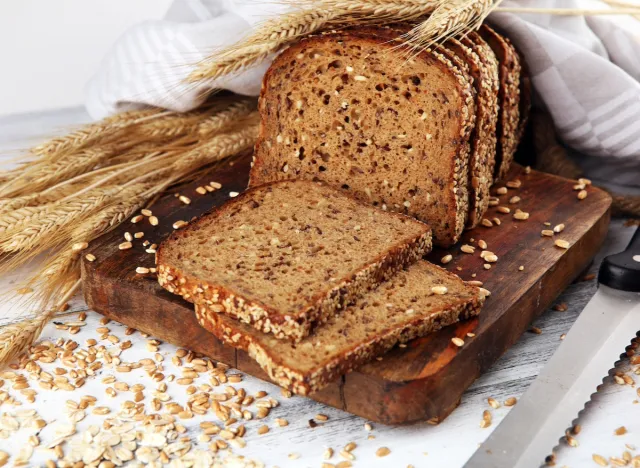10 Foods That Can Cause 'Brain Fog'

Feeling "fuzzy," having difficulty remembering things, and having trouble focusing is what many of us call "brain fog." Common causes of brain fog include experiencing stress or grief, going through the perimenopausal stage (for females), and exhaustion. But less known is that what you are eating may be giving you brain fog.
"Given that 'brain fog' is the layman's term to describe a collection of symptoms that affect one's neurocognition, it's important to remember that science is still evolving and exploring this concept. With that said, we know from understanding general physiology that foods that create inflammation can also create this inflammation in your brain, leading to feelings of fatigue, sleeplessness, and more," Liz Shaw, MS, RDN, CPT, Registered Dietitian, and author, shares.
She adds that "these foods are usually low in antioxidants and healthy fats, like omega-3s, and instead are high in trans fats, added sugars, and refined starches."
If you are focused on eating in a way that may mitigate your risk of experiencing brain fog, a balanced diet rich in essential nutrients and antioxidants can support brain health and cognitive function. Foods high in omega-3 fatty acids, such as fatty fish, flaxseeds, and walnuts, are particularly beneficial for mental clarity. Similarly, fruits and vegetables packed with antioxidants can protect the brain from oxidative stress, which can otherwise contribute to brain fog. Hydration plays a critical role as well, and inadequate water intake can lead to cognitive difficulties.
On the other hand, there are some foods you may want to limit or avoid if brain fog is a concern. Here are 10 foods that may be giving you brain fog, and limiting them may help keep your brain sharp. If you are experiencing brain fog, speak with your healthcare provider before you eliminate foods from your diet to ensure you are not experiencing an underlying concern that has nothing to do with your diet.
Ultra-processed foods

Ultra-processed foods are food items that have undergone multiple stages of processing and contain many added ingredients. These products are typically high in sugars, unhealthy fats, and sodium, and they often contain artificial preservatives, colorings, and flavorings.
Melissa Mitri, MS, RD, Registered Dietitian, Nutrition Writer, and Owner of Melissa Mitri Nutrition, explains that consuming ultra-processed foods has been thought to contribute to brain fog. These include breakfast cereals, packaged breads, and bakery products such as muffins and donuts, which are often laden with refined grains, added sugars, and unhealthy fats.
"Although the research is limited, there has been an association between consuming ultra-processed foods and cognitive decline. In addition, we know that higher consumption of these foods has other harmful health effects, so it's best to eat them sparingly.
Food additives

"Food additives are substances added to food for a variety of purposes, including extending shelf life and adding color or flavor," Mitri explained.
She added that some people report "feeling brain fog after eating a few of the most popular food additives, including monosodium glutamate (MSG) and artificial sweeteners such as aspartame".
The science around brain fog and food additives appears to be primarily anecdotal, but if you find you're feeling foggy after eating certain food additives, you can limit your consumption, Mitri advises.
Alcohol

"Alcohol is a huge culprit for brain fog because of its effects on both hydration and your central nervous system," explained Mitri. "Not only can you feel foggy while drinking, but its effects can be felt for days after as well".
If you notice you feel brain fog after drinking alcohol, it may be best to abstain from drinking and have a mocktail instead, Mitri cautioned, adding that "you can potentially reduce the effects of brain fog from alcohol by staying well-hydrated and having electrolytes before or after drinking. This is because alcohol use can cause dehydration, which impairs cognition."
Candy

Candies, being a perfect example of ultra-processed foods, can significantly contribute to brain fog. They are often packed with high amounts of sugar, which can lead to sudden spikes in blood sugar levels. These spikes can be followed by a blood sugar drop, leaving individuals feeling fatigued, distracted, and mentally foggy.
Fried Food

Fried foods can also contribute to brain fog. They are typically high in unhealthy fats and salt, and low in nutrients. Regular consumption of fried foods can lead to increased inflammation in the body, a factor contributing to brain fog.
Hot Dogs

Hot dogs may also contribute to brain fog. These foods are often high in sodium, nitrates, and other preservatives which can cause inflammation in the body, thereby triggering symptoms of brain fog. Additionally, these meats often contain high levels of unhealthy fats and are usually devoid of essential nutrients.
Regular Soda

Soda, particularly those high in sugar, can also contribute to brain fog. The high sugar content in many sodas can lead to a rapid spike and subsequent crash in blood sugar levels, causing feelings of sluggishness, often associated with brain fog. To mitigate instances of brain fog and promote overall brain health, it's recommended to limit the intake of soda and opt for healthier beverage choices like water, herbal tea, or 100% fruit juices.
Gluten

The relationship between gluten consumption and brain fog is of particular interest, especially to those with sensitivities or intolerances to this protein found in wheat, barley, and rye. Gluten can trigger an inflammatory response in the gut of individuals with Celiac disease or non-celiac gluten sensitivity, which can lead to systemic inflammation affecting numerous bodily systems, including the brain. This inflammation, coupled with nutrient malabsorption, can result in a state of cognitive impairment often referred to as "brain fog". Symptoms may include difficulty concentrating, forgetfulness, and a lack of mental clarity. While research is still ongoing in this area, anecdotal evidence supports a link between gluten consumption and brain fog in sensitive individuals.
Caffeinated Drinks

Caffeine, widely consumed in beverages like coffee and tea, can also contribute to brain fog. Paradoxically, while small amounts of caffeine can enhance alertness and concentration, excessive consumption often leads to the opposite effect; this is due to dehydration and overstimulation of the nervous system. Overuse of caffeine can lead to a "rebound effect", resulting in fatigue, headaches, and brain fog as the stimulating effect wears off.
Refined carbohydrates

Refined carbohydrates, also known as processed carbohydrates, are grain products that have been significantly modified from their naturally occurring state. This process often involves the removal of the grain's bran and germ, which are the most nutrient-dense parts, leaving only the starchy endosperm. Examples of refined carbohydrates include white bread and white rice.
Refined grains could also contribute to brain fog. Like refined sugars, these grain products have been stripped of their most nutritious parts, leaving only the starchy endosperm. The result is a food that—unlike whole grain foods—causes a quick rise and fall in blood sugar levels. The body responds to these fluctuations with a release of hormones, leading to the symptoms commonly associated with brain fog, such as confusion, forgetfulness, and difficulty focusing.
- Source: https://pubmed.ncbi.nlm.nih.gov/34714198/
- Source: https://www.ncbi.nlm.nih.gov/pmc/articles/PMC2868080/#:~:text=Diets%20that%20promote%20inflammation%20are,and%20whole%20grains%20(1).
- Source: https://www.ncbi.nlm.nih.gov/pmc/articles/PMC4555146/
- Source: https://pubmed.ncbi.nlm.nih.gov/32792031/
- Source: https://pubmed.ncbi.nlm.nih.gov/22855911/#:~:text=Being%20dehydrated%20by%20just%202,assessment%20of%20the%20subjective%20state.
- Source: https://pubmed.ncbi.nlm.nih.gov/22855911/#:~:text=Being%20dehydrated%20by%20just%202,assessment%20of%20the%20subjective%20state.
- Source: https://www.ncbi.nlm.nih.gov/pmc/articles/PMC8224613/
- Source: https://www.ncbi.nlm.nih.gov/pmc/articles/PMC8746707/









